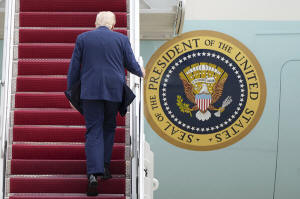Trump roars down multiple paths of retribution as he vowed. Some targets
yield while others fight
[March 31, 2025]
By ERIC TUCKER and CALVIN WOODWARD
WASHINGTON (AP) — The executive order directed at one of the country's
most prestigious law firms followed a well-worn playbook as President
Donald Trump roared down the road to retribution.
Reaching beyond government, Trump has set out to impose his will across
a broad swath of American life, from individuals who have drawn his ire
to institutions known for their own flexes of power and intimidation.
Which is how the Paul Weiss, a storied New York law firm that since its
1875 birth has advanced the cause of civil rights, shepherded the legal
affairs of corporate power brokers and grown into a multi-billion-dollar
multinational enterprise, came to learn it was in trouble. The reason:
One of its former attorneys had investigated Trump as a Manhattan
prosecutor.
Trump ordered that federal security clearances of the firm's attorneys
be reviewed for suspension, federal contracts terminated and employee
access to federal buildings restricted. Yet the decree was soon averted
in the most Trumpian of ways: with a deal.
After a White House meeting with the firm's chairman yielded a series of
commitments, including $40 million worth of legal work to support
administration causes, the executive order was rescinded, but not
without a backlash from a legal community that saw the resolution as a
capitulation.
The episode showed not only Trump's use of the power of the presidency
to police dissent and punish adversaries but also his success in
extracting concessions from law firms, academia, Silicon Valley and
corporate boardrooms. These targets were suddenly made to fear for their
futures in the face of a retribution campaign that has been a defining
feature of his first two months in office.

Just one day after Paul Weiss' deal, Columbia University disclosed
policy changes under the threat of losing billions of dollars in federal
money. A week later, the venerable law firm of Skadden, Arps, Slate,
Meagher & Flom cut a deal of its own before it could be hit by an
executive order. Before that, ABC News and Meta reached
multi-million-dollar settlements to resolve lawsuits from Trump.
“The more of them that cave, the more extortion that that invites,” said
Ty Cobb, a White House lawyer in Trump’s first term who has since become
a sharp critic. “You’ll see other universities and other law firms and
other enemies of Trump assaulted and attacked into submission because of
that."
Some within the conservative legal community, by contrast, say the
Republican president is acting within his right.
“It's the president's prerogative to instruct the executive branch to do
business with companies, law firms or contractors that he deems
trustworthy — and the converse is true too,” said Jay Town, a U.S.
attorney from Alabama during Trump's first term. “The president, as the
commander in chief, can determine who gets a clearance and who doesn't.
It's as simple as that.”
Some targets have not given in, with two law firms since the Paul Weiss
deal suing to block executive orders. Yet no matter their response, the
sanctioned firms have in most instances run afoul of the White House by
virtue of association with prosecutors who previously investigated
Trump.
If the negotiations have been surprising, consider that Trump
telegraphed his approach during the campaign. “For those who have been
wronged and betrayed, I am your retribution," he told supporters in
March 2023.
Less clear was: Retribution for what exactly? Against whom? By what
means?
The answers would come soon enough.
One firm called Trump threat 'an existential crisis’
Fresh off surviving four federal and state indictments that threatened
to sink his political career, and investigations that shadowed his first
term in office, Trump came straight for the prosecutors who investigated
him and the elite firms he saw as sheltering them.

His Justice Department moved almost immediately to fire the members of
special counsel Jack Smith's team and some prosecutors who handled cases
arising from the Capitol riot on Jan. 6, 2021.
The White House followed up with an executive order that stripped
security clearances from the lawyers at the law firm of Covington &
Burling who have provided legal representation for Smith amid the threat
of government investigations. Covington has said it looks forward to
"defending Mr. Smith's interests."
A subsequent order punished Perkins Coie for its representation of
then-Democratic presidential nominee Hillary Clinton during the 2016
campaign and its part in funding opposition research on Trump that took
the form of a dossier containing unsubstantiated allegations about
Trump's ties to Russia.
Its business hanging in the balance, Perkins Coie hired Williams &
Connolly, a Washington firm with an aggressive litigation style, to
challenge the order. A federal judge said the administration’s action
sent “chills down my spine" and blocked portions of it from taking
effect. That decision could have been a meaningful precedent for other
beleaguered firms.
Except that's not what happened next.
The chairman of Paul Weiss said it, too, was initially prepared to sue
over a March 14 order that targeted the firm in part because a former
partner, Mark Pomerantz, had several years earlier overseen an
investigation into Trump’s finances on behalf of the Manhattan district
attorney’s office.
But the firm also came to believe that even a courtroom victory would
not erase the perception among clients that it was “persona non grata”
with the administration, its chairman, Brad Karp, later told colleagues
in an email obtained by The Associated Press.
The order, Karp said, presented an “existential crisis” for a firm that
has counted among its powerhouse representations the NFL and ExxonMobil.
Some of its clients signaled they might abandon ship. The hoped-for
support from fellow firms never materialized and some even sought to
exploit Paul Weiss' woes, Karp said.

“It was very likely that our firm would not be able to survive a
protracted dispute with the Administration,” he wrote.
When the opportunity came for a White House meeting and the chance to
cut a deal, he took it, pledging pro bono legal services for causes such
as the fight against antisemitism as well as representation without
regard to clients' political affiliation. In so doing, he wrote, “we
have quickly solved a seemingly intractable problem and removed a cloud
of uncertainty that was hanging over our law firm.”
[to top of second column]
|

President Donald Trump boards Air Force One at Joint Base Andrews,
Md., Friday, March 28, 2025, en route to Florida for the weekend.
(AP Photo/Jacquelyn Martin)

The outcry was swift. Lawyers outside the firm ridiculed it. More than
140 Paul Weiss alumni signed a letter assailing the capitulation.
“Instead of a ringing defense of the values of democracy, we witnessed a
craven surrender to, and thus complicity in, what is perhaps the gravest
threat to the independence of the legal profession since at least the
days of Senator Joseph McCarthy," the letter said.
Within days, two other firms, Jenner & Block and WilmerHale, were
confronted with executive orders over their affiliation with prosecutors
on Robert Mueller's special counsel team that investigated Trump during
his first term. Both sued Friday. WilmerHale, where Mueller is a retired
partner, said the order was an “unprecedented assault” on the legal
system. After hearing arguments, judges blocked enforcement of key
portions of both orders.
Yet that very day, the White House trumpeted a fresh deal with Skadden
Arps in which the firm agreed to provide $100 million of pro bono legal
services and to disavow the use of diversity, equity and inclusion
considerations in its hiring practices.
Trump has expressed satisfaction with his pressure campaign, issuing a
directive to sanction lawyers who are seen as bringing “frivolous”
litigation against the government. Universities, he marveled, are
“bending and saying ‘Sir, thank you very much, we appreciate it.'”
As for law firms, he said, “They’re just saying, ‘Where do I sign?’
Nobody can believe it.'”
One Ivy League university also acceded to Trump's demands
Uptown from Paul Weiss's Midtown Manhattan home base, another elite New
York institution was facing its own crucible.
Trump had taken office against the backdrop of disruptive protests at
Columbia University tied to Israel's war with Hamas. The turmoil
prompted the resignation of its president and made the Ivy League school
a target of critics who said an overly permissive campus environment had
let antisemitic rhetoric flourish.
The Trump administration this month arrested a prominent Palestinian
activist and legal permanent resident in his university-owned apartment
building and opened an investigation into whether Columbia hid students
sought by the U.S. over their involvement in the demonstrations.

In a separate action, the administration pulled $400 million from
Columbia, canceling grants and contracts because of what the government
said was the school's failure to stamp out antisemitism and demanding a
series of changes as a condition for restoring the money or for even
considering doing so.
Two weeks later, the then-interim university president, Katrina
Armstrong, announced that she would implement nearly all of the changes
sought by the White House. Columbia would bar students from protesting
in academic buildings, she said, adopt a new definition of antisemitism
and put its Middle East studies department under new supervision.
The university's March 21 rollout of reforms did not challenge the Trump
administration's coercive tactics, but nodded to what it said were
“legitimate concerns” raised about antisemitism. U.S. Education
Secretary Linda McMahon has said the university was “on the right track”
but has not yet indicated whether funding might be restored.
The Columbia resolution was condemned by some faculty members and free
speech advocates.
“Columbia’s capitulation endangers academic freedom and campus
expression nationwide,” Donna Lieberman, executive director of the New
York Civil Liberties Union, said in a statement at the time.
Armstrong on Friday night announced her exit from the position and her
return to her post atop the school’s medical center.
Columbia is not Trump's sole target in academia. Also this month, the
administration suspended about $175 million in federal funding for the
University of Pennsylvania over a transgender swimmer who last competed
for the school in 2022.
Media companies have also been a target
Trump had not even taken office on Jan. 20 when one legal fight that
could have followed him into office abruptly faded.
In December, ABC News agreed to pay $15 million toward Trump’s
presidential library to settle a defamation lawsuit over anchor George
Stephanopoulos’ inaccurate on-air assertion that the president-elect had
been found civilly liable for raping writer E. Jean Carroll.

The following month, Meta, the parent company of Facebook, agreed to pay
$25 million to settle a lawsuit filed by Trump against the company after
it suspended his accounts following the Jan. 6 riot.
The agreement followed a visit by Meta CEO Mark Zuckerberg to Trump's
private Florida club to try to mend fences. Such a trip may have seemed
unlikely in Trump's first term, or after the Capitol siege made him,
briefly, a pariah within his own party. But it's something other
technology, business and government officials have done.
The administration, meanwhile, has taken action against news
organizations whose coverage it disagrees with. The White House last
month removed Associated Press reporters and photographers from the
small group of journalists who follow the president in the pool and
other events after the news agency declined to follow Trump’s executive
order to rename the Gulf of Mexico; a suit by the AP is pending.
And the administration has sought to dismantle Voice of America, a U.S.
government-funded international news service. On Friday, a federal judge
halted plans to fire more than 1,200 journalists, engineers and other
staff who were sidelined after Trump ordered a funding cut.
All contents © copyright 2025 Associated Press. All rights reserved
 |